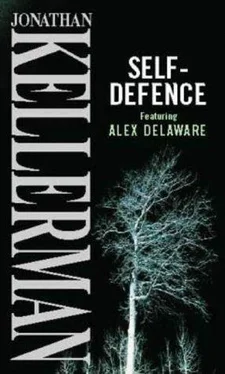The music switched to the Beach Boys' "In My Room." One of the browsing girls brought a rolled poster over to the clothes counter and looked around as she fished money out of her jeans.
The man said, "I'll take that here."
He put down his paper. The girl came up and paid for her poster and left with her friends, laughing.
The man swallowed a mouthful of egg-muffin and watched the girls wiggle the glass doors.
"Having fun," I said.
"Yeah," he said. "You see what she bought? Stud poster- centerfold from Pretty Boy. It's meant for gays, but they put out a calendar and it sold so well to women, they decided to market the months separately." He grinned. "In our day, girls weren't like that, huh?"
"Not the ones I knew."
"So what is it for you?" he said. "Reincarnation, or just passing through from Chicago?"
"Reincarnation?"
"Second childhood. Second chance at the big wave. That's what it usually is when a guy your age comes in. Or a tourist wanting to bring home a little piece of California for Aunt Ethel."
I laughed. "I'm looking for bathing trunks."
He hit his forehead and gave another grin. "Wrong again. Good thing I don't gamble. Suits are over there."
I went over to a rack marked DUDES and flipped through the merchandise. A pair of baggy black trunks caught my eye because of a square patch with a Saint Bernard over the pocket bearing the legend BIG DOG. The mutt's tongue was out and he looked mischievous. Clearly a spiritual brother to Spike. I pulled the shorts off the rack and brought them up.
The man said, "Cool baggies," and rang up the sale.
I said, "What do the guys having a second childhood usually buy?"
"The works: board, board cover, leash, wet suit, wax, sport sandals, zinc, hair dye. We have the suits custom-cut for us; usually they're freaked out to see what size they take now. Plus all the changes in board technology. A guy your age might have rode something as big as a tree trunk. Name of the game now is minimum weight."
Turning his hand into a blade, he sliced air.
"The new stuff, once you get the feel, it's like hydroplaning. You can drive out to Zuma or County Line and see kids that are basically Jesus walking on water."
"Sounds like you did a bit of water work yourself."
"Still do." He grinned and handed me my receipt. "No second childhood for me, 'cause I never got out of my first."
The chimes sounded. A dark-haired woman had opened the door and stuck her foot in.
"I need help, Tom."
She was tall and nice-looking with a narrow, graceful figure and long thin arms with some muscle definition. Her hair was wavy and very short, almost black, her eyes so light they seemed pupil-less. The sun had cured her face to tight bronze leather. She wore high-cut pink shorts that exposed long smooth legs. Her blouse was white and sleeveless and tucked in snugly.
Tom said, "Just finishing up a sale, babe."
She didn't smile or answer, just kept standing there in the door. I heard a powerful engine idling and looked out to see a white Ford van conversion, smoke puffing from its rear.
The woman cleared her throat.
Tom said, "Here you go, pal, enjoy 'em."
I left the store, taking as long as possible to get back to the Seville. Once in the car, I sat behind the wheel pretending to look for something. A few seconds later Tom Shea came out of the shop and followed his wife to the van. She got behind the wheel and closed the driver's door and a metal ramp slid out from the rear of the vehicle. It touched the asphalt and I heard it scrape. Tom opened the rear door and reached in, back muscles bunching, as he pulled on something. A moment later an electric wheelchair appeared in the doorway, bearing a slumping, bronze-haired boy.
Tom guided the chair down the ramp. I started the Seville and inched out, watching. The boy could have been anywhere from twelve to twenty. His head was large and it lolled, eyes wide, tongue extended. His shrunken body was belted into the chair. Despite the restraint, he slanted sharply to the right, the head almost touching his right shoulder. One arm was belted, too. The other clutched a joystick at the front of the chair.
Tom wasn't smiling. He said something, and the joystick hand moved. The chair rolled down the ramp, very slowly, and when it was on the asphalt Tom closed the van door. Then he got behind the chair and guided it up the cement slope toward the store. The van's engine cut off and Gwen Shea came around, sprinted up ahead, and held the store door. As Tom eased the chair through, I caught a glimpse of the boy's face. Sleepy, but grinning. Big grin, almost voracious.
His hair a thick, straight mat, the kind that might turn silver-minnow when it aged.
But he reminded me of more than his father.
As I drove away, I realized what it was.
The grin. Triumphant, cartoonish.
He was an atrophied version of the surfer on the sign.
Years ago, the mother of a severely brain-damaged child sat in my hospital office and cried for half an hour without break. When she finally stopped, she said, "I love her, but God forgive me, sometimes I want her to die." She never cried again in my presence, and whenever we passed in the hall she looked away from me with a face that was part despair, part rage.
The same face Gwen Shea wore.
The idea of approaching her about a twenty-one-year-old disappearance seemed ridiculous and cruel. What reason did I have to believe Best wasn't just an old man deluded by hope?
I caught a green light and sped out of Malibu into the Palisades, making my way to Rockingham Avenue and possibly more delusions.
***
The house was a sizable two-story Tudor with pink roses and blue agapanthus along the front and a low hedge of waxy privet bordering the brick walkway. A white Ford Taurus with a rental sticker sat in the driveway. Ken Lowell answered the door wearing a blue suit and holding a Filofax. His shoes were shined and his hair was wet.
"Morning, just on my way out."
He let me into a parqueted foyer. A statuary-marble center table held a black vase full of white silk flowers. Behind it, the stairway was a softly curving arc of polished oak.
The front rooms on either side were dark and vaulted, shaded by heavy cream damask drapes and filled with gleaming furniture.
"Nice repo," I said.
Ken nodded. "The owners cut out to Europe overnight. Food in the fridge and clothes in the closet. Some kind of shopping center deal that went bad. People are looking for them."
"Been seeing a lot of that lately?"
"More than usual for the last couple of years. It's what we specialize in. We pick them up from the bank, rehab them, and turn them around. I guess that makes us capitalist exploiters." He smiled and picked out one of the silk flowers. "It's not what I thought I'd be doing when I was in Berkeley."
"What were you interested in then?"
"My sister Jo was an archaeology major; she turned me on to old bones. After she graduated, she went to Nepal to climb around and explore. I flew there to be with her and we hung out together in Katmandu- place called Freak Street, Telegraph Avenue transplanted to the Himalayas." He shook his head and looked at the flower. "I was with her when she died."
"What happened?" I said.
"We were hiking. She was experienced, very athletic. This was just a stroll for her. But she put her foot down and something gave way and she fell over a hundred feet. I was way behind. She passed right by me as she went down, landed on a ledge full of sharp rocks." He touched his eyes and pressed down on the lids. Then his hands flew to his lapels.
A door opened on the upstairs landing, and Lucy came down the stairs.
"Morning," she said, looking at Ken. "Everything okay?"
Читать дальше












